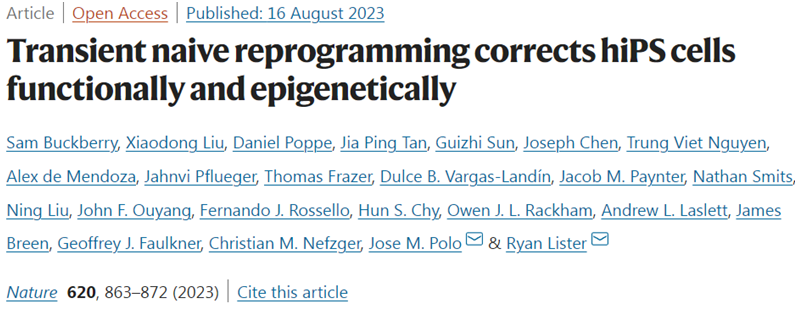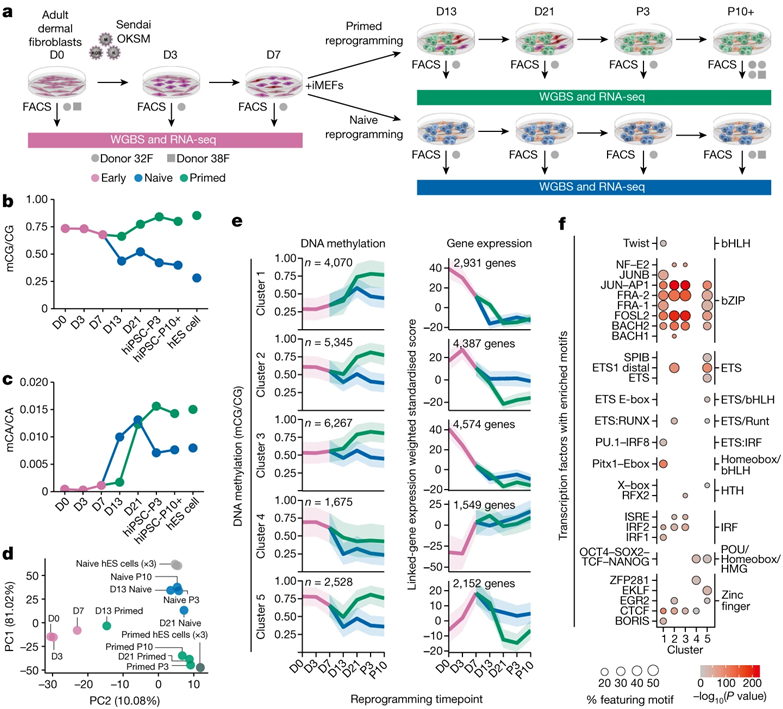
Pluripotent stem cells such as embryonic stem cells (ESC) and induced pluripotent stem cells (iPS) are special cells in the human body that can become any other type of cell.
Pluripotent stem cells have great medical potential. Clinical trials are under way to use pluripotent stem cells to replace damaged cells in diseases such as Parkinson's disease.

One way to obtain pluripotent stem cells is from human embryos, but there are ethical problems and practical limitations. Another way is to convert adult cells from the skin or other parts of the skin into so-called iPS cells. However, iPS cells sometimes carry "memories" of the kind of cells they used to be, which may make them less predictable or effective when trying to convert them into other types of cells. In a new study, researchers from Australia's University of Western Australia, University of Adelaide and Monash University (co-lead author Liu Xiaodong of West Lake University) found ways to erase this memory and make iPS cells function more like embryonic stem cells. The results were published online on August 16, 2023 in the journal Nature. The paper was titled "Transient naive reprogramming corrects hiPS cells functionally and epigenetically".
The great prospect of regenerative medicine
Mature, specialized cells, such as skin cells, can be reprogrammed into iPS cells in the laboratory.
IPS cells have a bright future in the field of regenerative medicine.
Scientists can make iPS cells from a patient's own tissue cells, so new cells produced by iPS cells have a lower risk of being rejected by the patient's immune system.
The research on the use of iPS cells is a rapidly developing field, but there are still many technical challenges. Scientists are still trying to figure out how to better control which cell type iPS cells become and ensure that the process is safe. One of these technical difficulties is "epigenetic memory (epigenetic memory)", in which iPS cells retain traces of their former cell types.
Epigenetic memory and how it affects the use of iPS cells
Human DNA carries a sequence of instructions called genes. When a variety of factors affect gene activity (turning genes on or off) without changing the DNA sequence itself, this is called epigenetics. The epigenetic genome of a cell is a general term that describes all epigenetic modifications in the cell. Every cell in the body contains the same DNA, but the epigenome controls which genes are turned on or off, which determines whether it is a heart cell, a kidney cell, a hepatocyte or any other cell type.

from Nature, 2023, doi:10.1038/s41586-023-06424-7
When a mature cell is reprogrammed into an iPS cell, people want to remove all its epigenetic modifications. However, this does not always work completely.
When some epigenetic modifications are preserved, this "epigenetic memory" affects the behavior of iPS cells.
IPS cells made from skin cells retain part of the "memory" of skin cells, making it more likely to return to skin cells and less likely to return to other types of cells. This is because some epigenetic markers of DNA tell iPS cells to behave like skin cells.
This may be an obstacle to the use of iPS cells because it affects the process of turning iPS cells into the type of cells that people want. It may also affect the function of iPS cells after production. If you want to use iPS cells to help repair the pancreas, but these cells have the "memory" of skin cells, they may not function as well as real pancreatic cells.
How to clear the epigenetic memory of iPS cells and improve their function
Overcoming the epigenetic memory problem of iPS cells is a recognized challenge for regenerative medicine. By studying how the epigenetic genome changes when adult skin cells are reprogrammed into iPS cells, the authors found a new cellular reprogramming method that can erase epigenetic memory more thoroughly. They made the discovery by reprogramming the cells using a method that mimics the natural reset of the embryonic cell epigenome.
Epigenetic markers inherited from sperm and eggs are basically removed during early development before the embryo is implanted into the womb. This reset enables early embryonic cells to restart and become any type of cell during embryo growth and development.
By introducing a step into this reprogramming process to briefly simulate the reset process, the authors created iPS cells that are more like embryonic stem cells than traditional iPS cells. More effective elimination of epigenetic memory of iPS cells will improve their medical potential. This will make iPS cells behave more like embryonic stem cells, making them more likely to transform into any desired cell type.
If iPS cells can forget their past identity, they can more reliably become any type of cell and help create specific cells for treatment, such as new insulin-secreting cells for diabetics or neurons for people with Parkinson's disease. When iPS cells are used in medical treatment, it may also reduce the risk of unintentional behavior or complications.
Reference:
1. Sam Buckberry et al. Transient naive reprogramming corrects hiPS cells functionally and epigenetically. Nature, 2023, doi:10.1038/s41586-023-06424-7.
2. A 'memory wipe' for stem cells may be the key to better therapies. https://theconversation.com/a-memory-wipe-for-stem-cells-may-be-the-key-to-better-therapies-206230